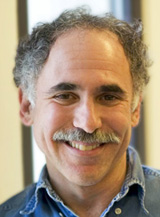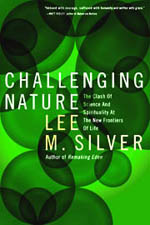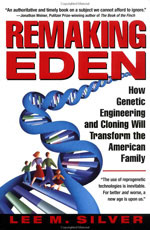|
published by Ecco/Harper Collins, 2006
|
|
Challenging Nature
Previous books
Presentations
Publications/Writings
Biography
Princeton teaching
|
From the Magazine | Visions 21
Can You Make My Kid Smarter?
A dispatch from the frontiers of 21st century genetics
Posted Monday, Nov. 8, 1999
Just as their marketing consultant had predicted, a simple name change spawned an explosive growth in the customer base of the St. Genevieve fertility clinic. Only 10 months earlier, in April 2024, the clinic had begun its new advertising campaign for "Organic Enhancement" on websites frequented by women with babymaking on their minds. "Why not give your child the best possible start in life?" was the tease. A few seconds of eye focus on the ad automatically brought viewers to St. Gen's home page, where they could see the full pitch:
"Consider using our patented Organic Enhancement protocol to provide your child with all-natural resistance to heart disease, hypertension, diabetes, stroke and eight different forms of cancer, as well as absolute protection against aids, allergies, asthma and Alzheimer's disease. But keep in mind, you must act before you get pregnant. Don't be sorry after she's born. This really is a once-in-a-lifetime opportunity for your child-to-be."
The response was immediate and enormous. The market for organic enhancement of newly fertilized embryos quickly overtook infertility treatment. Ironically, most of the prospective parents who now crowded the waiting room at the St. Gen "fertility" clinic had no fertility problems at all.
The outcry from long-standing critics was also immediate. They pointed out that St. Gen's "enhancement" technology added new genes to every cell in a child's body. Furthermore, there was a very good chance the child would pass these genetic alterations on to her children as well. "Wasn't this simply germ-line genetic engineering with a new name?" they asked wryly.
The St. Gen spokeswoman responded that anyone could call the technology whatever they wanted, but Organic Enhancement was the term St. Genevieve had chosen to use. "This is entirely appropriate," she said with a straight face, "since the DNA molecules added to embryos are totally organic." She noted also that the treatment was "all-natural," since the added genes were produced naturally by cultured cells and were indistinguishable from those found in other members of the human population.
Germ-line genetic engineering was first performed successfully on animals and plants in the 1980s. By the end of the 2nd millennium, no geneticist doubted the potential for applying the technology to humans as well. But at that time, scientific understanding of human genes was still fragmentary.
The completion of the Human Genome Project in 2003 changed everything. The project itself provided scientists with a catalog of every human gene. But over the following decade, pharmaceutical companies put this catalog to use in studies of very large numbers of people. Among the many important findings of these studies was the discovery that for nearly every disease, there were at least a small number of people who carried specific and powerful "protecting" genes. By 2020, the list of such "natural protection" genes had expanded dramatically to cover all major infectious and noninfectious diseases.
It was the scientists at St. Gen who first grasped the significance of this discovery. The main technical objection to germ-line genetic engineering had been the premise that you could never know what effects an added gene would have until after the child was born. By that time, of course, it was too late to avoid unintended negative side effects. But if the gene already existed naturally in other people, you could study those people first to determine the gene's safety.
Fertility clinics have always occupied a peculiar place in the American medical system. From the birth of the field in the 1980s, political pressure from conservative religious groups prevented federal money from being used for any work on human embryos. As a result, top clinics operated quietly in the private sector, beyond the reach of most governmental regulations.
In the private sector, competition and the desire to expand into new markets fueled an intense research effort into new reproductive technologies. The most impressive technology of all was germ-line genetic engineering, which could be accomplished only by experts in human embryology, who were employed exclusively by private fertility clinics. The potential for profit was enormous, and financial support was easily obtained from biotech venture capitalists. Indeed, the unique American political-scientific-business environment boded well for global domination of the new field.
But first, St. Gen had a serious marketing problem on its hands. The term genetic engineering triggered images of Frankenstein-like scientists creating little monsters. This image was clearly not good for business. What could they do to change the public's view? At this point, their highly paid marketing consultant earned her keep. "Change the name!" she bellowed. "Call your service Organic Enhancement, and prospective parents will come running."
How right she was!
The clinic called a press conference after the first organically enhanced child was born. The reporters shouted out their questions to the mother nursing her baby in her arms.
"Isn't it unethical? How could you change your baby's genes when she was unable to give consent?"
"Why is it unethical to provide my child with the best possible chance for a healthy life?" the mother responded. "Why can't I give my child protective genes that other children get naturally?"
In a short time, as more and more parents brought home happy, healthy babies, the debate faded away. Meanwhile, the scientists at St. Gen had their eyes on the future. A mere thousand genetic changes had been identified that were mostly responsible for the difference between the intelligence of chimpanzees and humans. Now if they could just ratchet up those genes...
Lee M. Silver is a professor of molecular biology and public affairs at Princeton University and the author of Remaking Eden: How Genetic Engineering and Cloning Will Transform the American Family
|
Hover over or click on books to order from Amazon.com
|


